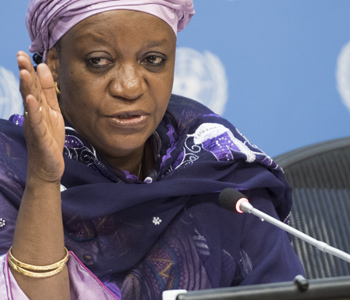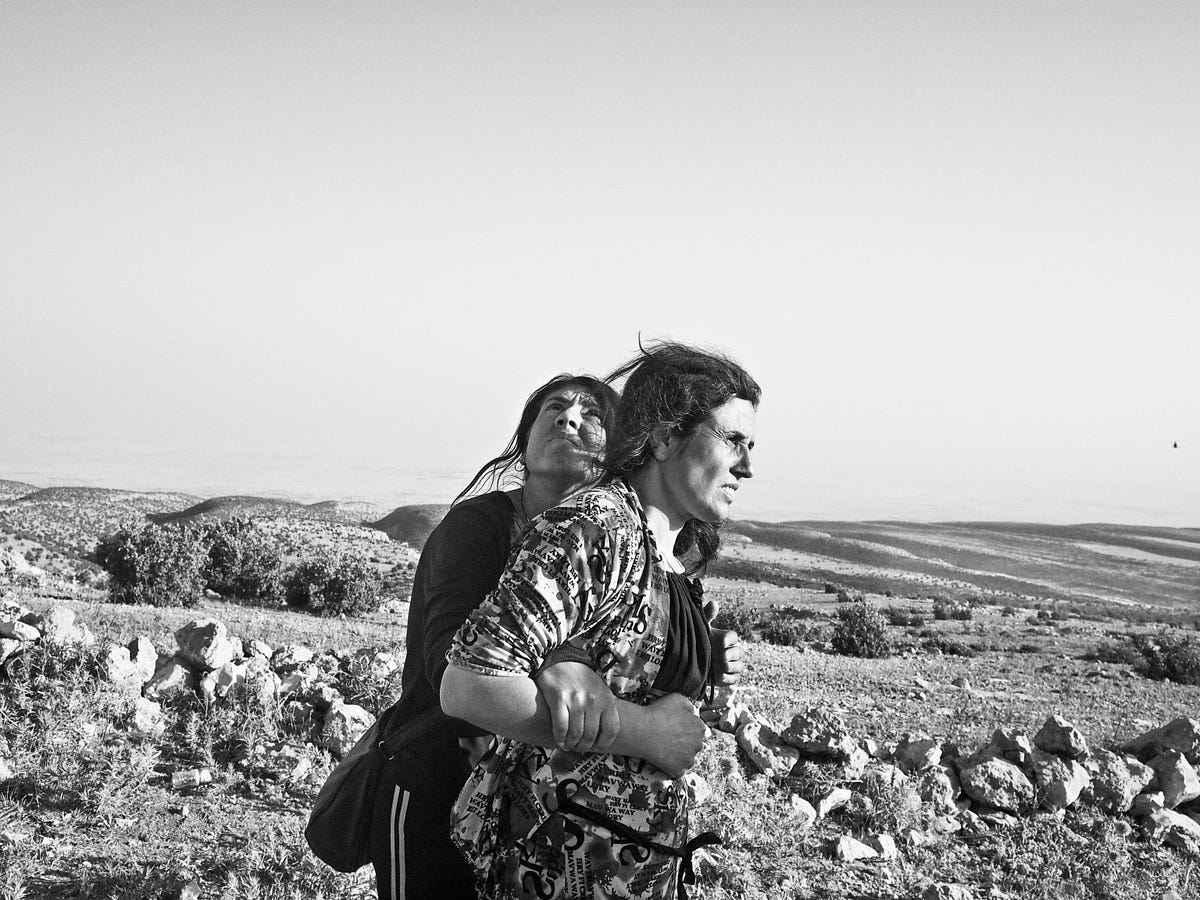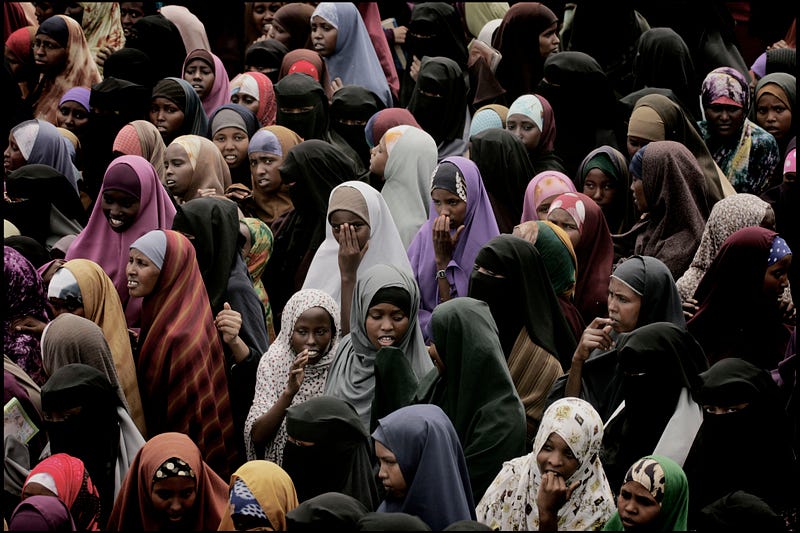
Faith in Islam & Faith in Women: Why Gender Justice is Key to an Islam Without Extremes
By Zainab Bangura, Special Representative of the UNSG on Sexual Violence in Conflict

The greatest battle of the 21st century is between rising violent extremism, which harks back to an age of barbarity, and the promise of universal human rights, which heralds an era of pluralism and shared prosperity.

Women’s rights and freedoms are central to that struggle. The wars wrought by extremist groups in Iraq, Syria, Somalia, Nigeria, Mali, and elsewhere are being fought on the bodies of women and girls who are subjected to horrendous, systematic abuse. Furthermore, these battles are, to a large extent, being fought over the bodies of women and girls, which are treated as contested male terrain.
For instance, the Islamic State of Iraq and the Levant’s (ISIL) notorious Mount Sinjar offensive of August 2014 has been considered as much a sexual conquest to enslave women as it was a territorial advance. Similarly, Boko Haram has abducted girls from their schools in north-east Nigeria pursuant to a campaign of forced imprisonment and forced impregnation. It is profoundly disturbing to me, as a Muslim, that these atrocities are committed — and perceived to be committed — in the name of Islam, a religion which literally means “peace”.
Extremist groups like ISIL and Boko Haram view female bodies as vessels for producing a new generation that can be raised in their own image, according to their radical ideology.
This is why we have witnessed shocking photographs of infants swaddled in ISIL’s black flag, sleeping soundly alongside guns and grenades. It is also why ISIL has established “marriage bureaus” in areas under their control to encourage women to wed fighters and raise their families. According to ISIL’s guidebook for young mothers, entitled Sisters’ Role in Jihad, techniques for rearing children, the so-called “Cubs of the Caliphate”, should include playing with toy guns and infusing bedtime stories with messages of martyrdom and jihad.
To populate ISIL’s self-proclaimed “Caliphate” with “pure” believers, and project it far into the future, women and girls have been abducted, enslaved, denied education, raped, forcibly married, traded, trafficked, coercively converted to Islam, subjected to forced impregnation and, sometimes, forced abortion.
Control over women’s sexuality and reproduction is integral to the nation-building aspirations of ISIL and its affiliates.
In this regard, they seem more akin to the fascist movements that arose before and during the Second World War, than to the small-scale insurgencies that have risen and fallen since. While the international community primarily views this threat in military terms, ISIL sees itself as much more than a terrorist insurgency. It sees itself as constructing an idyllic nation for adherents of its authoritarian strand of Islam, who number more than 40,000 to date. In their single-minded pursuit of a fascist theocracy, they oppose diversity and human rights in general, and gender equality in particular.
A common factor that presages the rise of authoritarian and extremist movements is their assault on women’s rights and freedoms.
This often includes strict enforcement of traditional dress codes and gender segregation, as well as the use of women’s bodies as a breeding ground for the next generation of fighters. Nazism included bureaus dedicated to both women and eugenics, including the sterilisation of those deemed “unfit”, and lauded motherhood as the sole purpose of female existence. Today, the use of women as biological weapons for changing the demographics of a region is part of ISIL’s genocidal campaign against religious and ethnic minorities. They are attacking the kinship ties that bind Yazidi, Christian and Turkmen Shia communities, so that new families can be forged.
The chilling historical parallels with fascism underscore that today’s war against extremism is not a war with Islam or the Muslim world, but rather with tyranny and intolerance.
Revealing the true, authoritarian agenda of ISIL’s leaders divests them of the mantle of religious legitimacy they crave
In April 2015, I visited the Middle East and saw directly how women are firstaffected and worst affected by protracted conflict and attendant displacement. Displaced civilians, the vast majority of whom are women and children fleeing their homes for fear of their lives, remain at high-risk even when they reach the supposed refuge of neighbouring states. I visited the camps and urban settlements in Turkey, Jordan and Lebanon, which together host almost four million Syrians, putting stress on their political systems, as well as on basic utilities. My visit confirmed both the shocking trend of sexual violence being employed as a tactic of war and terror in the region, and the acute risk of sexual exploitation and trafficking by criminal elements in places of supposed refuge.
It is important to recognise that most of these refugees fled Syria even before ISIL assumed control of a third of their country, due to an increasingly bitter civil war. This conflict created a chaotic environment conducive to the rise of extremism and the rule of the gun.
Every day that passes without a peaceful solution to the crisis in Syria is another day that women and girls are exposed to crushing brutality.
In addition to forcing civilians to flee strategic areas and terrorising populations into submission, sexual violence serves to advance a number of ISIL’s tactical imperatives. To encourage recruitment, they appeal to young, single, economically marginalised men who are seeking status, power and sexual access not afforded to them in their conservative societies. Some men rally to the cause out of a sense of emasculation, arising from unemployment and fear of encroaching “Western values” like women’s empowerment.
Conflict is a license to reassert outmoded models of masculinity.
Sexual violence is also part of the political economy of this crisis. It is used to generate revenue through the trafficking, trading and ransoming of women and girls who are openly sold and bartered on slave markets in ISIL’s stronghold of Raqqa, sometimes for a few thousand dinars, sometimes for as little as a pack of cigarettes. In this way, women have become part of the currency ISIL uses to consolidate its power. They have been monetised as the “spoils of war” — claimed, appraised and exchanged for profit — much like the region’s plundered antiquities and artefacts.

ISIL’s methods and ideas have been characterised as medieval, yet the way they communicate them is distinctly modern. Men and women from over 100 countries have been lured into their ranks as fighters, medics or brides through sophisticated social media messaging. Benefitting from advanced media and weapons technology, while calling for a return to the seventh-century slave trade, is just one of many contradictions that expose ISIL’s amoral opportunism. Despite this, hundreds of women have been seduced by their romanticized narrative, often for the same reasons as men: the call of adventure, a sense of purpose, and escape from limited socio-economic circumstances.
Having been raised in a conservative Muslim family myself, I can understand this yearning for broader horizons. Yet we also know that, in this instance, it has been tragically and cynically manipulated. ISIL defectors have expressed deep disillusionment with the reality of harsh living conditions, corruption and un-Islamic behaviour they encountered on the ground, in stark contrast to the utopian propaganda.
Women have long observed that “the personal is political” and, for me, the political quest for gender justice and an end to conflict-related sexual violence is also deeply personal.
As both a Muslim and a women’s rights activist, I recognise that every step forward for women’s rights is also a small victory in the fight against fundamentalism. This conviction is reinforced by the Islamic values that guide my life, namely: respect for humanity, tolerance, and protection of the vulnerable.
No problem has ever been solved through silence; yet rape, particularly in Muslim countries, has a hidden history owing to deeply entrenched social taboos. For survivors in conservative contexts, the stigma can be a life sentence, while the perpetrators walk free. ISIL flagrantly publicises its abuses, while the women and girls who survive them are shamed into silence — sometimes even suicide — or subjected to “honour killings”. The violation of a woman’s chastity is viewed as an affront to the “honour” of her family and community, which prizes female virginity and links it with any prospect of marriage and social status. Until we change this cultural construct, and address the root causes that embolden perpetrators, women and girls will always be at risk.
In my homeland of Sierra Leone, an estimated 65,000 women and girls were raped during eleven years of civil war. The shame was particularly acute in conservative Muslim and traditional communities. Similarly, the mass rape of Bosnian Muslim women during the conflict in the former Yugoslavia was a devastating vehicle of “ethnic cleansing” and humiliation that tore apart the fabric of families and communities as a whole. During Algeria’s civil war, armed Islamist groups abducted, enslaved, and raped women and girls with the aim of forcing them to give birth to “good Muslims”. This violence was suppressed and rendered socially invisible and, half a century later, impunity still prevails. Following the politically motivated mass rape in Guinea, Conakry, of September 2009, the vast majority of victims refused to come forward for medical and psychosocial support owing to the stigma of sexual violence in this conservative, mostly Muslim, society. Many of the women who did speak out, or were identified as rape victims, reported being abandoned by their husbands and cast out of their homes.
Against this bleak historical backdrop, I work to amplify the voices of women and highlight their experiences, including in peace and conflict-resolution processes. In this effort, my religion gives me strength, resilience and conviction. But it also gives me pause. The misrepresentation, misinterpretation and misuse of religious scripture can corrupt cultural and political life. Moderate and modernist voices must reclaim our religion from the fanatics. The Muslim world must chart its own road to democracy and freedom, and women must be at the table in defining the rules of the road moving forward, including what it means to be a Muslim. That is the only way to ensure they will be free to drive down that road once it is built.
Winning the battle of ideas is every bit as important as a decisive military response to ISIL, which represents one of the greatest threats to world order today.
Religious leaders can no longer stand-by; they must stand-up and take action to address injustice and promote peace through public education. They must demonstrate that cultural norms are malleable, not divinely mandated. In February 2015, Yazidi spiritual leader Baba Sheikh called for his community to support, rather than ostracise, women who had escaped ISIL captivity. Altering tradition in this way has been a source of solace to many Yazidi rape survivors who had felt that suicide was their only option.
This is an inspiring example, but much more is needed. There are still over 2,000 women and girls in ISIL captivity. Extremist groups proudly place the subordination of women at the top of their agenda. In response, the UN should elevate women’s protection, empowerment and rights to the top of ours, and invest in building the capacity of women’s groups, including from minority communities, to lead grassroots efforts to counter extremism.
Despite the grave challenges of this historical moment, I have faith in my religion and faith in women as innovators and authors of an Islam without extremes. Women are a buffer against youth radicalisation and repeated cycles of violence. Indeed, our best hope for winning the future is to enable the next generation to be raised under the influence of educated and empowered mothers, rather than under the insidious and lengthening shadow of ISIL’s black flag.




